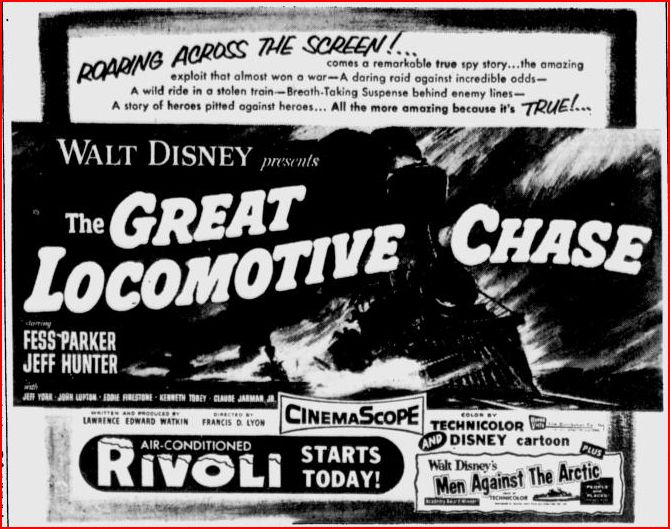
It must have been a worrisome film for Parker, Disney's Davy Crockett, to make so soon after seeming to become a superstar, because it must have seemed as if Disney was typecasting him as a doomed hero. More worrisome still may have been the way Jeffery Hunter, in effect playing the Keaton role, not only steals the train back but quite nearly steals the film from Parker, as if to prove that Keaton's choice of hero was more dramatically correct if not politically correct. Using the character's real name, William Fuller, rather than Keaton's Johnnie Gray, Hunter plays it straight and more realistic, yet with some of Keaton's indomitable determination. Keaton was making a comedy that is also arguably the first action movie as we understand the concept today, and it was important in both respects that he retake his train alone. As Fuller, Hunter has help every step of the way, but is the indisputable leader and motivator of his little band. He's at his most Keatonesque early on in the chase, when he initially, madly goes after the General on foot until he and the men trailing behind him find a handcar. The film as a whole is often Keatonesque in its commitment to authenticity -- Disney sent Lyon down to the actual historic locations in Georgia -- and an aversion to fakery for the most part. The history simply lends itself to a certain epic manner of filmmaking, but while Keaton made it into a comic epic Disney, Lyon and screenwriter Lawrence Edward Watkin made a thriller undermined by that same history, lurching from suspense to suspense as the Union team is nearly exposed or fails yet again to thwart Fuller's pursuit, until it succumbs to cumulative anticlimax, while Keaton used the actual events as a springboard for advanced slapstick.
Shackling themselves to history, the Disney team must give up the locomotive chase with something like a half-hour left in the picture. We're set up to expect a desperate escape back to Union lines, but Parker's whole gang is promptly captured -- most of them, including Parker himself, offscreen. The film then builds toward a mass prison break that serves only to resolve the character arc of a supporting player -- Jeff York apparently was cast in this role because he'd been Mike Fink to Parker's Crockett -- and while the idea is for Andrews and the other guy to give the others time to flee, most of them -- though not the relatively dull fellow who narrates the story and receives one of the first Medals of Honor -- are rounded up offscreen and herded back to prison to be hanged. It was all worthwhile, we're told at the end, because it diverted Confederate troops to railroad guard duty, but the film leaves you with not so much an appreciation of heroic sacrifice as pity for Andrews and the other losers. The film's self-defeating quality, its many pictorial virtues notwithstanding, leave you wondering whether Disney, eager as a train enthusiast to make a film about the chase, felt he couldn't make Fuller the hero because he thought Keaton might have been able to sue. In the end, historical accuracy is the only advantage Great Locomotive Chase has over The General. The later film can't help but look like a rough draft of the former, despite Technicolor and Cinemascope, in part because Keaton was so far ahead of his time as an action filmmaker but also because, thirty years before Disney, he had already remade tragedy as farce.
No comments:
Post a Comment